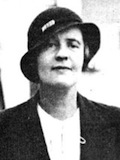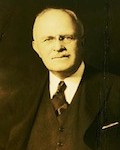Journalist Dorothy Thompson (1893-1961) spoke out vigorously against the persecution of Jews by the Nazis.
As chief of the Berlin bureau of the New York Post in the late 1920s and early 1930s, Thompson witnessed the rise of Nazism and reported extensively on the mistreatment of Germany’s Jews. Thompson, who was once named by Time magazine as the second most influential woman in America (after Eleanor Roosevelt), coined the term “cold pogrom” to describe the legal and administrative measures used by the Hitler regime to bring about the economic ruin of German Jewry. In 1934, she became the first American journalist to be expelled from Nazi Germany.
In the wake of the Kristallnacht pogrom, Thompson established a Journalists Defense Committee to raise funds for the legal defense of Herschel Grynszpan, whose assassination of a Nazi diplomat in Paris became Hitler’s pretext for the violence.
Thompson was appalled by the Roosevelt administration’s decision, in June 1941, to reject visa applications from anyone with close relatives in Axis territory. She and other prominent journalists signed a statement criticizing the new policy as “a serious and unnecessary departure from cherished American traditions.”
In late 1942, Thompson mobilized fifty prominent German-Americans, including former baseball star Babe Ruth, to sign a declaration condemning the mass murder of the Jews and urging the overthrow of the Hitler government. The World Jewish Congress paid to have the statement published as a full-page advertisement in the New York Times and other leading newspapers.
In 1944, Thompson authored articles supporting the proposal to create “free ports,” or temporary havens, in the United States for European Jewish refugees.
Sources: Wyman, The Abandonment of the Jews, pp.63-64, 263; Leff, Buried by The Times, pp.97-98.









